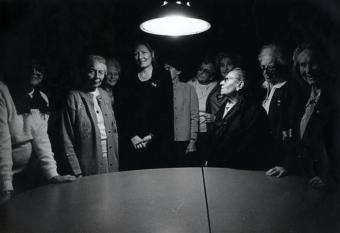 |
SLADKÉ STOLETÍ
Das süße Jahrhundert Sweet Century Helena Trestiková Tschechien 1998 Produktion: Tschechisches Fernsehen, Nadace Clovek a cas (The People in Time Foundation )Weltvertrieb: Tschechisches Fernsehen, Telexport Dept. Kavci hory, 140 70 Prag 4,Tschechische Republik. Tel.: (420-2) 612 12 945, Fax: (420-2) 612 11 354. e-mai: denisa.strbova@czech-tv.cz Buch und Regie: Helena Trestiková Produzenten: Z. Cervenkov·, K. UhÌirova·, Martin Kopriva. Dramaturgie: H. JemelÌková·, J. Platz, M. Trestik. Kamera: Joséf Nekvasil, Martin Kubala, Ervin Sanders. Musikalische Beratung: J. Spitzer. Ton: V. Nahodil, J. Kubiéek, Jan Cenek. Schnitt: Zdenik Patoéka. Produzenten: Z. Cervenkov·, K. Uhlirová, Martin Kopriva. Interviewpartner: AlbÌna (Alca) Palkoskoá·, Dagmar Skálá·, Hilda Ciháková, Jitka Puflerová. Format: Video, Farbe/Schwarzweiß. Länge: 59 Minuten. Sprache:Tschechisch. |
Babylon Do.11.02.1999 19.00 Arsenal Fr.12.02.1999 17.30 Arsenal Fr.12.02.1999 24.00 |
|
| Trestikovas Frauen, ehemalige politische Gefangene, erinnern sich an ihre schrecklichen Erlebnisse und reflektieren sie mit Weisheit und Lebenserfahrung. In ihre Erinnerungen wird Filmmaterial eingefügt, welches das soziale und politische Leben der Ersten Tschechischen Republik, die Zeit der deutschen Besetzung und die der kommunistischen Diktatur beschreibt. Das Archivmaterial, voll von scheinbar trivialen Details, ist besonders aussagereich. Der sonderbare Kontrast zwischen dem Pathos der einzelnen Geschichten und dem politischen Optimismus der namenlosen jungen Frauen erinnert an die absurde Unwirklichkeit jener Zeit und erklärt die bittere Ironie des Filmtitels. |
The twentieth century sweeps
through Central Europe like a storm. Everything is in flux: frontiers,
constitutions, governments, ideologies and political slogans. Few people
can expect to live in peace and fulfil their ambitions. THE SWEET CENTURY
is a film about several women who were not destined to lead the lives
they planned. |
| Biofilmographie
/ Biofilmography Helena Trestiková studierte an der Prager Filmhochschule FAMU und arbeitet seit 1972 als Filmemacherin. Sie hat mittlerweile um die dreißig Dokumentarfilme gedreht, die sich vor allem mit menschlichen Beziehungen und verschiedenen sozialen Problemen beschäftigen. Helena Trestiková studied film at the Prague Film Academy (FAMU) and started working professionally in 1972. She has made around thirty documentaries, mostly concerned with human relationships and various social problems. Films (selection) /Filme (Auswahl) 1975: Zázrak (The Miracle). 1981: Dotek svetla (Touching Light). 1987: Manzelskè etudy (Studies of Marriage). 1992: Pavlina (part of the long-term cycle Rekni mi neco o sobe / Tell Me Something About Yourself). 1993: Renè (part of the long-term cycle Rekni mi neco o sobe / Tell Me Something About Yourself). 1993: Kaspar. 1994: Láda (part of the long-term cycle Rekni mi neco o sobe / Tell Me Something About Yourself). 1994: Martin, aneb bytci mit (Martin, or To Be or To Have; part of the long-term cycle Rekni mi neco o sobe / Tell Me Something About Yourself). 1995: Sladkè horkosti Lidy Baarovè (The Sweet Bitterness of Lida Baarová). 1997: Milan-Zráni zla (Milan-Evil ripening; part of the long-term cycle Rekni mi neco o sobe / Tell Me Something About Yourself). 1998: Vylouceni z literatury (Excluded from Literature). 1998: SLADKÉ STOLETÍ |
|